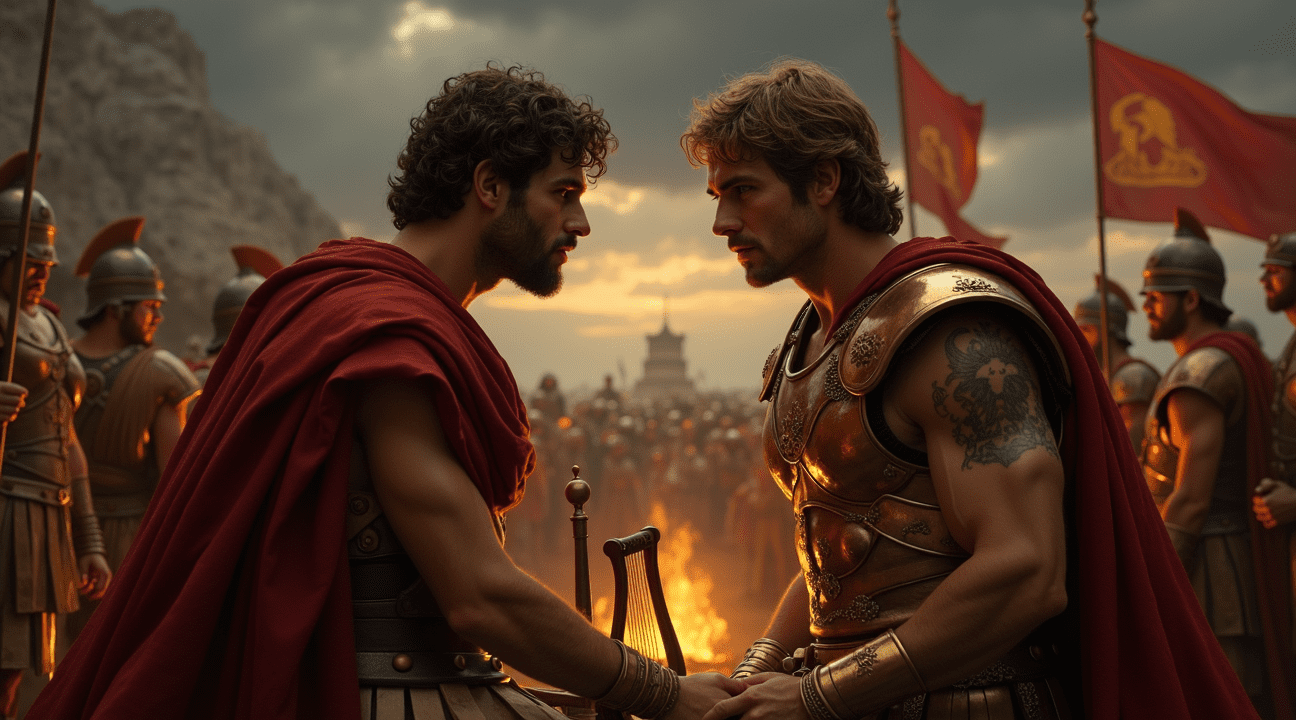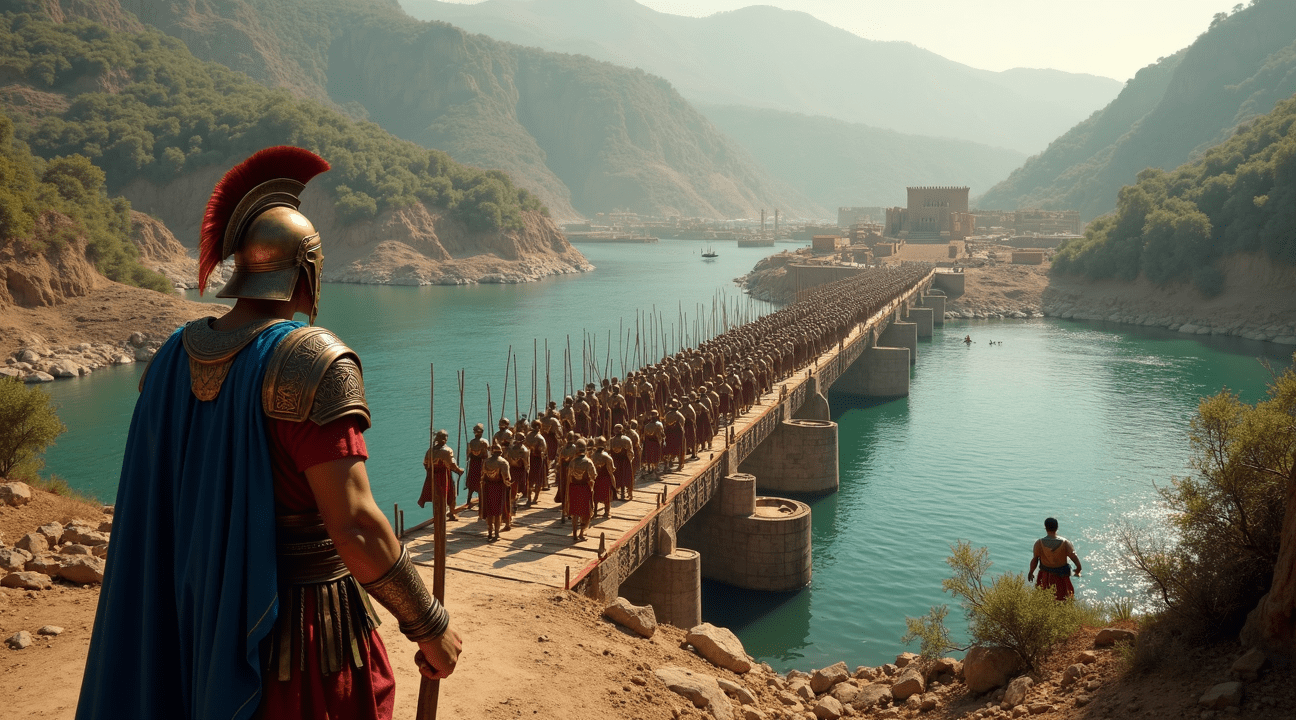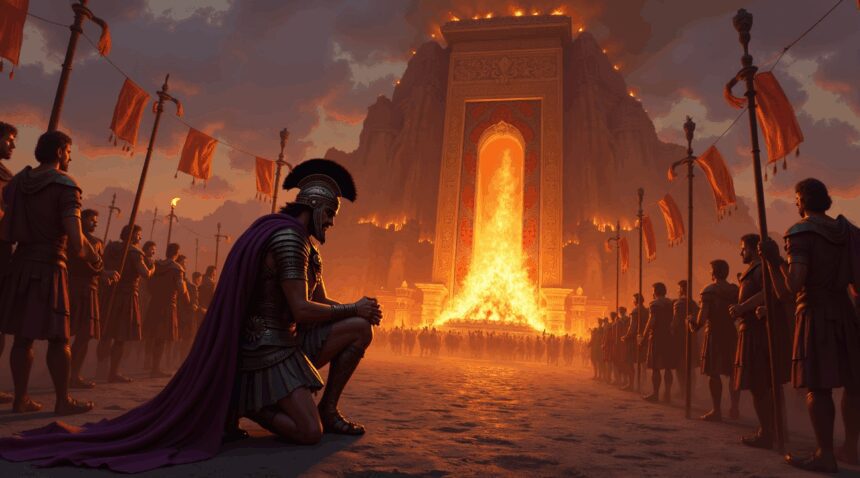Alexander the Great’s bond with Hephaestion stands as one of history’s most compelling and mysterious relationships, drawing comparisons to legendary figures and raising enduring questions about the nature of friendship and loyalty in antiquity.
Key Takeaways
- Alexander exhibited remarkable grief following Hephaestion’s death, organizing unparalleled funeral honors and commemorations that exceeded anything previously witnessed for a military companion. This act demonstrated the exceptional depth of their relationship.
- Hephaestion functioned as Alexander’s most trusted military commander, leading half the army during the Indian campaign and overseeing critical engineering projects such as the bridge construction across the Indus River. His role was vital beyond personal friendship.
- Their simultaneous marriages to Persian princesses at Susa—Alexander to Stateira and Hephaestion to Drypetis—formed a strategic alliance meant to blend Macedonian and Persian royal bloodlines. Alexander intended to become uncle to children produced from both unions.
- Ancient historians documented their exclusive connection without classifying it sexually, focusing instead on their emotional closeness, mutual decisions, and Alexander’s unwavering trust in Hephaestion, above all his other companions.
- The cultural ethos of ancient Greece celebrated intense male friendships, especially among warriors and aristocrats. This social context provides important insight into understanding their bond without imposing modern relationship norms.
To explore further, the Encyclopedia Britannica’s article on Alexander the Great provides valuable background on his life and relationships, including his alliance with Hephaestion.
Alexander’s Unprecedented Grief: The Death That Shook an Empire
The death of Hephaestion in Ecbatana in 324 BC triggered an emotional response from Alexander the Great that stunned the ancient world. Ancient sources document how the mighty conqueror, who had faced countless battles and conquered vast territories, completely broke down upon losing his closest companion. Alexander refused to eat or drink for days, behavior that shocked his generals and courtiers who had never witnessed such vulnerability from their leader.
Extraordinary Funeral Honors and Commemorations
Alexander’s grief manifested in unprecedented ways that revealed the depth of his bond with Hephaestion. He organized elaborate funeral games and commemorations that surpassed anything previously seen for a military companion. The scale of these tributes demonstrated how Alexander viewed Hephaestion not merely as a friend, but as someone deserving of honors typically reserved for royalty or deities.
The construction projects Alexander commissioned in Hephaestion’s memory further emphasized this exceptional status. Massive shrines rose in multiple locations, including Alexandria and on the island of Pharos. These weren’t simple monuments but elaborate structures that required enormous resources and skilled craftsmen. Such investments showed Alexander’s determination to ensure Hephaestion’s legacy would endure long after both men had departed the earth.
Emotional Intensity That Echoed Ancient Literature
Alexander’s behavior during this period struck contemporary observers as almost supernatural in its intensity. He pardoned officials and rewarded those involved in memorial activities, displaying generosity intertwined with grief. This unusual combination of mourning and magnanimity highlighted how profoundly Hephaestion’s death had affected his decision-making processes.
Ancient historians like Plutarch and Arrian documented the extraordinary nature of Alexander’s emotions with careful attention to detail. They compared his mourning to Achilles’ grief for Patroclus from Homer’s Iliad, drawing parallels that elevated the relationship between Alexander and Hephaestion to legendary status. This comparison wasn’t made lightly — it suggested that contemporary observers recognized something truly exceptional in their bond.
The uniqueness of Alexander’s response becomes even more apparent when contrasted with how he treated other losses. No other associate of Alexander, regardless of their military prowess or political importance, received such extensive honors.
- Veterans who had served faithfully for years
- Generals who had won crucial battles
- Advisors who had provided valuable counsel
All passed away without generating comparable displays of grief from their commander.
Alexander’s outward expression of mourning challenged conventional expectations for how rulers should behave. Ancient leaders were expected to maintain composure and demonstrate strength even during personal losses. However, Alexander’s response showed a man completely overwhelmed by emotion, prioritizing his grief over political considerations or public image.
The intensity of these memorial activities also revealed strategic thinking beneath the emotional response. By elevating Hephaestion’s status posthumously, Alexander sent clear messages about loyalty and friendship within his empire. The massive resource allocation for shrines and commemorations demonstrated that extraordinary service and personal connection would be remembered and honored appropriately.
Contemporary accounts suggest that Alexander’s grief persisted far beyond the initial shock of loss. He continued commissioning memorials and honoring Hephaestion’s memory even as other pressing military and administrative matters demanded attention. This sustained focus on commemorating his fallen companion showed how deeply Hephaestion’s absence affected Alexander’s daily existence and long-term planning.
The historical significance of Alexander’s grief extends beyond personal tragedy. Ancient sources preserved detailed accounts of his response precisely because it was so unusual for a ruler of his stature. These records provide valuable insights into both Alexander’s character and the nature of his relationship with Hephaestion, helping modern historians understand the human elements behind one of history’s most legendary figures.
https://www.youtube.com/watch?v=7289545287096356127
More Than Friends: The Achilles and Patroclus Connection
The bond between Alexander and Hephaestion transcended ordinary friendship, reaching depths that ancient historians struggled to fully capture in their writings. Arrian, Plutarch, and Curtius Rufus all documented Hephaestion’s unique position as Alexander’s most trusted confidant and advisor, someone who held influence that extended far beyond military matters. This relationship possessed an intensity that set it apart from Alexander’s other close associations.
Alexander himself drew deliberate parallels between his bond with Hephaestion and the legendary connection of Achilles and Patroclus from Homer’s Iliad. Alexander the Great and Hephaestion’s relationship mirrored this mythological pairing in ways that weren’t lost on those who witnessed their interactions. Alexander saw himself as Achilles, the great warrior, while Hephaestion embodied the role of Patroclus, the beloved companion whose loyalty knew no bounds.
Ancient Perspectives on Their Connection
Ancient writers approached their relationship with careful language, often implying rather than stating outright the nature of their emotional devotion. Several key aspects defined their bond:
- Hephaestion served as Alexander’s primary emotional anchor during campaigns
- He acted as a diplomatic intermediary when others couldn’t reach the king
- Their shared childhood created an unbreakable foundation of trust
- Alexander consulted him on matters both personal and strategic
- Their connection influenced major military and political decisions
The mythological comparison wasn’t merely romantic nostalgia on Alexander’s part. Greek culture celebrated the Achilles and Patroclus story as the pinnacle of devotion between companions, whether interpreted as friendship or love. This cultural backdrop provided Alexander with a framework to understand and express his feelings for Hephaestion.
Ancient sources consistently avoided explicit discussion of sexuality, yet the emotional intensity they described suggests something profound. Plutarch noted how Alexander’s grief after Hephaestion’s death rivaled Achilles’ mourning for Patroclus. The king’s subsequent actions—including elaborate funeral preparations and his own rapid decline—demonstrated a connection that defied conventional explanations.
Modern scholars continue debating whether their relationship was romantic, platonic, or something that ancient Greek society understood differently than contemporary definitions allow. What remains clear is that Hephaestion occupied a singular place in Alexander’s life, one that combined personal intimacy with professional collaboration in ways that shaped the course of history.

The Royal Marriage That Made History
Hephaestion’s union with Drypetis stands as one of the most strategically significant marriages in ancient history. This carefully orchestrated alliance went far beyond typical diplomatic marriages of the era, representing Alexander’s vision for a truly unified empire that would bridge East and West through the strongest personal bonds.
A Bond Between Royal Houses
Both Drypetis and Stateira, Alexander’s own bride, were daughters of the fallen Persian king Darius III. This double marriage created an unprecedented connection between Macedonian leadership and Persian royalty. Alexander’s decision to pair his closest companion with the sister of his own wife demonstrated the exceptional trust and status he placed in Hephaestion above all other generals.
The political implications of this arrangement extended well beyond symbolism. Alexander envisioned himself as uncle to any children Hephaestion and Drypetis might produce, effectively intertwining the bloodlines of both empires in ways that would create lasting legitimacy for Macedonian rule in Persia. This represents a profound shift from traditional conquest models, where conquered territories remained separate entities under foreign domination.
Strategic Unity Through Personal Trust
Alexander rarely granted such honors to his other commanders, making Hephaestion’s elevation through marriage particularly noteworthy. The partnership between the two men had already shaped military campaigns and administrative decisions throughout their conquests. Now it would potentially shape the genetic and political future of the known world.
The marriage ceremony itself took place during the mass weddings at Susa, where Alexander encouraged numerous Macedonian officers to take Persian brides. However, Alexander the Great and Hephaestion’s relationship made their parallel marriages uniquely significant among all the unions celebrated that day.
This strategic alliance reflected Alexander’s broader goals of creating a hybrid Greco-Persian culture that would govern his vast territories. Rather than ruling conquered peoples from a distance, he sought to create genuine integration through the most powerful tool available—family bonds that would span generations and legitimize his empire’s continuation long after his death.
Trusted General: Hephaestion’s Military Command and Strategic Importance
Alexander rarely divided his forces, but he placed half his army under Hephaestion’s command during the Indian campaign—an unprecedented demonstration of military trust. This decision revealed Alexander’s absolute confidence in his companion’s tactical abilities and strategic judgment, particularly in unfamiliar territory where mistakes could prove catastrophic.
Engineering Excellence and Logistical Mastery
Hephaestion demonstrated remarkable engineering prowess throughout Alexander’s conquests, most notably during the bridge construction over the Indus River. This massive undertaking required sophisticated knowledge of engineering principles, resource management, and coordinated labor forces spanning thousands of workers. Alexander entrusted this critical infrastructure project to Hephaestion because failure meant isolating the entire army in hostile territory.
Military logistics formed another cornerstone of Hephaestion’s contributions. He managed complex supply lines across vast distances, ensuring Alexander’s forces remained provisioned during extended campaigns.
Leading military efforts through the treacherous Khyber Pass required not only tactical skill but also deep understanding of supply chain management in mountainous terrain. Hephaestion’s success in these operations kept Alexander’s army mobile and combat-ready when other commanders might have faltered.
Combat Leadership and Strategic Victories
Battlefield performance validated Hephaestion’s strategic importance during major engagements like the Hydaspes River conflict in 326 BC. He commanded troops independently while coordinating with Alexander’s forces, demonstrating the tactical flexibility that made Macedonian armies so formidable. His ability to execute complex maneuvers while maintaining communication with the main force proved essential in securing victory against King Porus.
Siege warfare showcased another dimension of Hephaestion’s military expertise. The 30-day campaign at Peuceolatis tested his patience, strategic planning, and ability to maintain troop morale during prolonged operations.
Hephaestion’s systematic approach—combining siege engines, tactical positioning, and negotiation—exemplified classical siege methodology at its finest.
Independent operations further highlighted Hephaestion’s value beyond symbolic friendship. Alexander regularly assigned him autonomous missions requiring diplomatic finesse alongside military competence. These assignments included:
- Securing strategic positions
- Establishing garrison points
- Managing local populations in newly conquered territories
Success in such diverse responsibilities required exceptional leadership qualities that extended far beyond personal loyalty to Alexander.
Hephaestion’s consistent performance across engineering, logistics, combat leadership, and diplomatic missions established him as one of antiquity’s most capable military commanders. His strategic importance stemmed from proven competence rather than mere personal connection. Understanding Alexander the Great and Hephaestion’s relationship requires recognizing both its emotional depth and its foundation in mutual military respect.
Alexander’s empire depended on commanders who could execute complex operations independently while maintaining strategic coherence—qualities Hephaestion possessed in abundance.

The Historical Puzzle: What Ancient Sources Really Tell Us
Ancient historians left behind a complex web of evidence that doesn’t provide definitive answers about Alexander the Great and Hephaestion’s relationship, yet their accounts contain compelling clues that continue to spark debate among scholars today.
What the Ancient Writers Actually Recorded
Plutarch, Arrian, Curtius Rufus, and Diodorus Siculus documented Alexander’s extraordinary bond with Hephaestion, though none explicitly described a sexual relationship between the two men. These historians did, however, record several significant details that fuel ongoing speculation. They frequently drew parallels between Alexander and Hephaestion and the legendary pairing of Achilles and Patroclus from Homer’s Iliad. This comparison wasn’t accidental – Alexander consciously modeled himself after Achilles and encouraged others to see the connection.
Ancient sources consistently report several key aspects of their relationship:
- Alexander’s exclusive trust in Hephaestion above all other companions
- Their shared childhood and education under Aristotle
- Hephaestion’s unique access to Alexander’s private thoughts and decisions
- The profound grief Alexander displayed after Hephaestion’s death
- Alexander’s apparent emotional dependence on his closest friend
Historians note a striking contrast in Alexander’s behavior patterns. While he showed remarkable disinterest in romantic relationships with women throughout his life, his attachment to Hephaestion stood out as uniquely intense. Ancient writers documented that Alexander delayed marriage for political purposes and seemed to view women primarily through the lens of dynastic necessity rather than personal affection.
The cultural context adds another layer of complexity to interpreting these ancient accounts. Intense male friendships held special significance in ancient Greek society, particularly among the elite. However, the depth of emotional connection described between Alexander and Hephaestion exceeded typical friendships of their era, even by Greek standards.
Modern historians remain divided on interpretation. Some scholars emphasize the platonic nature of ancient Greek male bonds and argue that applying contemporary relationship categories distorts historical understanding. Others, including historian Robin Lane Fox, suggest that the evidence points clearly toward a romantic dimension in their partnership.
The ambiguity in ancient sources creates fascinating possibilities for interpretation. Alexander the Great and Hephaestion’s relationship continues to captivate both academic researchers and popular audiences precisely because the historical record provides enough detail to suggest profound intimacy while leaving essential questions unanswered.
This uncertainty ensures that their bond remains one of history’s most intriguing puzzles, with each new generation of scholars bringing fresh perspectives to the limited but tantalizing evidence left by ancient chroniclers.
Cultural Context: Ancient Greek Attitudes Toward Love and Friendship
Understanding the bond between Alexander the Great and Hephaestion demands a deep appreciation of ancient Greek perspectives on human connection. The cultural framework that shaped their relationship fundamentally differed from contemporary views on friendship, love, and sexuality.
Greek Concepts of Friendship and Affection
Ancient Greeks recognized multiple forms of love and friendship that don’t translate neatly into modern categories. They distinguished between eros (passionate love), philia (deep friendship), and storge (familial affection), creating a sophisticated vocabulary for human bonds that transcended simple romantic or platonic classifications. Within this context, intense male friendships carried profound cultural significance, often representing the highest form of loyalty and emotional connection.
The Greeks viewed passionate friendship between men as both natural and admirable, particularly among warriors and aristocrats. These relationships frequently involved deep emotional intimacy, mutual devotion, and shared goals that extended far beyond casual companionship. Military culture especially celebrated such bonds, believing they strengthened battlefield effectiveness and personal honor.
Symbolic Parallels and Cultural Meaning
The comparison between Alexander and Hephaestion to the legendary pair Achilles and Patroclus reveals the cultural weight their relationship carried. This parallel wasn’t casual literary flourish but indicated a conscious alignment with heroic ideals that resonated throughout Greek society. Homer’s portrayal of Achilles’ grief over Patroclus represented the pinnacle of devotion between companions, establishing a template for understanding exceptional male bonds.
Macedonian court customs further shaped how such relationships developed and were perceived. The royal court operated under distinct protocols that emphasized personal loyalty, shared military service, and exclusive companionship among elite warriors. These customs created an environment where intense personal bonds weren’t just accepted but expected among the highest-ranking members of society.
Historical sources consistently emphasize the exclusive nature of Alexander and Hephaestion’s connection without explicitly categorizing it in sexual or romantic terms. This absence of direct classification reflects ancient attitudes that focused more on the quality and intensity of the bond rather than its physical expression. Alexander the Great and Hephaestion relationship exemplified these cultural ideals of loyalty and devotion.
Ancient writers recorded their relationship through the lens of established cultural values that celebrated passionate friendship as a noble pursuit. They documented behaviors and emotions that demonstrated absolute loyalty, shared ambition, and mutual support—qualities that ancient societies valued above modern concerns about sexual categorization.
The historical record suggests that contemporaries understood their bond within existing frameworks of heroic friendship rather than viewing it as exceptional or requiring special explanation. This acceptance indicates that such relationships occupied a recognized place in ancient social structures, particularly among military and political elites who operated under different expectations than ordinary citizens.
Ancient Greek society’s nuanced approach to male affection allowed for expressions of love and devotion that might seem unusual through a modern perspective. Men could openly display emotion, share intimate moments, and declare deep affection without social stigma, provided these expressions aligned with cultural expectations of honor and virtue.
The documentation of Alexander and Hephaestion’s relationship in ancient sources reflects these broader cultural attitudes, presenting their bond as both remarkable and comprehensible within the context of their time. Writers emphasized the unique depth of their connection while treating it as an extension of recognized patterns of elite male friendship rather than an anomaly requiring explanation.
This cultural framework helps explain why ancient historians recorded their relationship with such detail and emotional weight. They recognized it as an exemplar of idealized friendship that embodied the values their society most admired—absolute loyalty, shared purpose, and unwavering devotion that transcended ordinary human connections.
Sources:
Wikipedia, “Hephaestion”
Wikipedia, “Alexander the Great”
The Archaeologist, “Is There Any Credible Evidence Linking Alexander and Hephaestion?”
World History Encyclopedia, “Hephaestion”
Ancient Heroes, “Arrian on Alexander the Great & Hephaestion” and “Were Alexander the Great and Hephaestion lovers?”
World Of Alexander The Great, “Hephaestion’s career”


